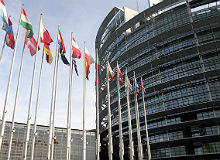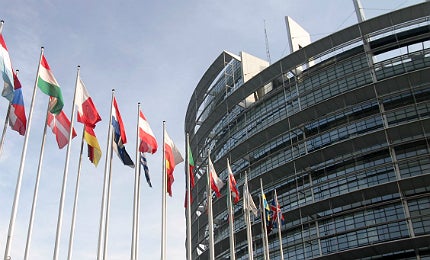

European Parliament building in Strasbourg, France. Image courtesy of Rama

Discover B2B Marketing That Performs
Combine business intelligence and editorial excellence to reach engaged professionals across 36 leading media platforms.
Cheap drugs and parallel trade in the EU
In the pharmaceutical industry, despite efforts to harmonise pricing across EU member states, individual countries remain free to set pricing laws for medical products and determine the price of goods sold.
The combination of member states’ rights to set prices and free trade within and between states has created the phenomenon of parallel trade – the legal repackaging and reselling of genuine, non-counterfeit drugs.
Parallel traders buy products in countries, such as Greece and Spain, where prices are lower, and export them at no cost to the UK, Germany and others, where prices are higher. The repackaging and transport costs are minimal, while the profit margin is huge.
Ultimately, market forces then lower drug prices in more expensive countries, demonstrating how the EU’s free market serves the consumer.

US Tariffs are shifting - will you react or anticipate?
Don’t let policy changes catch you off guard. Stay proactive with real-time data and expert analysis.
By GlobalDataEveryone loses out
In the 1990s, the European Court of Justice (ECJ) held that parallel trade was legal. However, as the phenomenon has grown, it has been necessary for the pharmaceutical industry to voice its objections. While the trade in drugs without the authorisation of the pharmaceutical company is legal, it has been criticised for undermining innovation, patient health and safety and the affordability of drugs.
Furthermore, the profit in parallel trade is made by the traders, while the large drug companies developing the products no longer benefit from a segmented market. As a result, drug companies are having their profit margins severely squeezed, due to a disproportionate shift in their sales to the countries that charge the least.
Major drug developers, such as GlaxoSmithKline and Astra Zeneca, claim that reduced profits translate directly to less money for research and development, which in turn means fewer medical treatments are released to the public. Therefore, the consumers benefitting in the short-term from lower prices will lose out in the long-term, along with the rest of the world.
When large drug companies make less profit, everyone loses, as pointed out when Richard Bergström, director general of the Brussels-based European Federation of Pharmaceutical Industries, told the Financial Times in June 2012: "Drug prices do not only reflect manufacturing but development costs. Someone needs to pay for innovation."
Parallel trade has also caused supply problems for patients in low-price countries. Parallel traders will buy up the cheaper Greek stock, which remains the largest market, to repackage and sell to countries where Gross Domestic Product (GDP) and prices are higher, thereby drastically reducing supplies for patients in Greece.
Bergström points out that: "We have heard stories of people showing up on a moped in Greek pharmacies to buy the entire stock of a product, so that nothing is available in a whole part of Athens." Such cases could have huge health implications for the Greek population.
Prevention and minimisation
The response to parallel trading within the pharmaceutical industry has been for the major producers to resort to innovative methods to prevent or minimise it.
Manufacturers and distributors now frequently adjust the delivery of stock, to match national prescription needs, not the demands of parallel traders. In Spain, wholesalers are offered a discount if they can show their retail sales have all taken place within national borders.
Legal battles have ensued, although the ECJ has not ruled definitively on the issue of the adjustment of delivery stock.
Advocate general at the ECJ, Sir Francis Geoffrey Jacobs, has revealed that the ECJ’s general view is that: "A restriction of supply by a dominant pharmaceutical company in order to limit parallel trade may be justified, as a reasonable and proportionate way of defending the company’s commercial interests."
The EU faces a major dilemma
The EU is in a precarious position. The principle of free trade is important to the Union’s financial stability, which requires the fervent and persistent abolition of quotas and barriers to trade.
In other words, the small business parallel trader must be protected by the free market. On the other hand, the complex pharmaceutical market and the fact that member states naturally feel they should retain the right to set prices and control supplies means the European Commission and the ECJ must balance divergent wishes.
The needs of patients across the EU member states, such as access to enough reasonably priced drugs as well as to the latest medication, further complicates matters. In addition, to encourage large pharmaceutical companies to bring research and production to the EU, as well as provide it with an adequate supply of goods, means the EU must demonstrate that drug companies can make a healthy profit. At present, parallel trade means that traders, rather than pharmaceutical companies, are the ones making the profit.
Time is of the essence
The European Union is in the wake of severe economic difficulty. Its political direction is also uncertain, as member states continually seek to redefine their roles. Any legal and political decisions will have to balance the competing interests of the many stakeholders in the pharmaceutical industry and the individuals who depend on its products.
The EU is becoming increasingly unattractive for business due to the growth in parallel trade, which could lead to future job losses and cutbacks if this dilemma is not addressed with some urgency.
Related content
Healthcare’s black hole: preventing pharmaceutical cargo theft
Cargo theft in the healthcare industry has increased across the globe, and even where actual incidence rates have dropped, the value of stolen items has increased significantly.
Full disclosure: GSK’s pledge to open clinical trial data
Just a few months after GlaxoSmithKline (GSK) pleaded guilty in the US to withholding safety data from regulators, the global healthcare company has been proactive in restoring its image.




